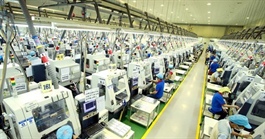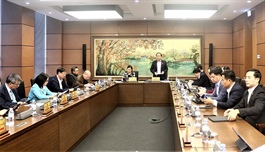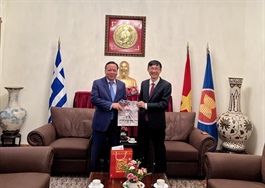Looking through weaknesses to attract EU capital flows: report
Looking through weaknesses to attract EU capital flows: report
The European Union-Vietnam Free Trade Agreement (EVFTA) and the European-Vietnam Investment Protection Agreement (EVIPA) have helped the country attract foreign direct investment (FDI) from EU member states.

However, the treaties also posed many challenges in luring capital from EU businesses, especially amid the uncertainties of the COVID-19 pandemic, as well as geopolitical and economic instability, in general, and the EU economy, in particular, a report showed.
Since 2010, EU enterprises have increased their investment in Viet Nam despite the fact that the United Kingdom (UK) left the bloc.
In general, the number of EU partners investing in Viet Nam tends to increase over the years. Especially in 2020, 26 out of 27 countries in this bloc registered to invest in the country. By August, the EU had a total of 2,378 valid projects in Viet Nam, worth US$27.59 billion, according to a report released on Tuesday at the workshop on "FDI flows from the EU to Viet Nam in the context of EVFTA and EVIPA".
Recently, EU businesses have been interested in service industries, clean energy, supporting industries, food processing, high-tech agriculture, and pharmaceuticals.
According to the report, the EVFTA and EVIPA have raised the scale of FDI from EU member countries and FDI in general due to commitments on tariff reductions and creating competitive advantages for the countries in attracting the EU’s FDI.
The main competitors in the region in terms of trade and investment do not have FTAs with the EU. Singapore is the only country in ASEAN that has signed an FTA with the EU.
However, this advantage may be short-term, as the orientation of both ASEAN and the EU is to sign an FTA between the two regions.
The agreements also contribute to the reorganisation of the EU's investment in Viet Nam by sectors and assist in creating a favourable environment through changes to the institutional and legislative framework.
"The implementation of EVFTA and EVIPA will be the driving force and requirement for the country to reform its institutions and legal framework, enhance the business environment, and provide more favourable and safer conditions for investors," Nguyen Thi Vu Ha, co-author of the research, said at the forum.
Nevertheless, these agreements are just one of many conditions required to get EU managers’ attention. The risks of the new context are likely to weaken the business sentiment of global entrepreneurs in general and EU investors in particular.
The digital transformation process may also narrow the EU's investment flows into Viet Nam, especially those investing in high-value sectors, due to the change in investment objectives of multinational enterprises.
“Foreign investors tend to choose Viet Nam for its cheap labour or natural resources, but in Industry 4.0, their goal is to find knowledge and technology. Unfortunately, this is not an advantage of the country because it still has many limitations in terms of skilled workforce and technological and financial capacity, while the quality of infrastructure for high-tech industries is still underdeveloped,” noted Nguyen Thi Thanh Mai, co-author of the report.
Besides, the EU's FDI comes with high corporate social responsibility standards in protecting and training workers as well as respecting and protecting the environment. Therefore, the implementation of EVIPA requires continuously improving the competitiveness of the Vietnamese economy and its readiness to take advantage of opportunities from the agreement.
And due to resource limitations, Viet Nam risks becoming a destination for low-quality FDI projects, the report pointed out.
At the event, Nguyen Chien Thang, director of the Institute of European Studies, said that the pandemic was also a cause for the reduction in EU capital flows as some countries pursued the near-sourcing approach, bringing manufacturing facilities back to their countries.
High transportation expenses were also a problem for investors because their main focus was making a profit, therefore they sought locations with better investment opportunities.
With all the difficulties, the report proposed strengthening research, popularising and disseminating information on the EVFTA and EVIPA, promoting institutional reform, improving the quality of the business environment and infrastructure, reforming the financial market, and focusing on training to build a workforce that meets high-skill industry demand.






















